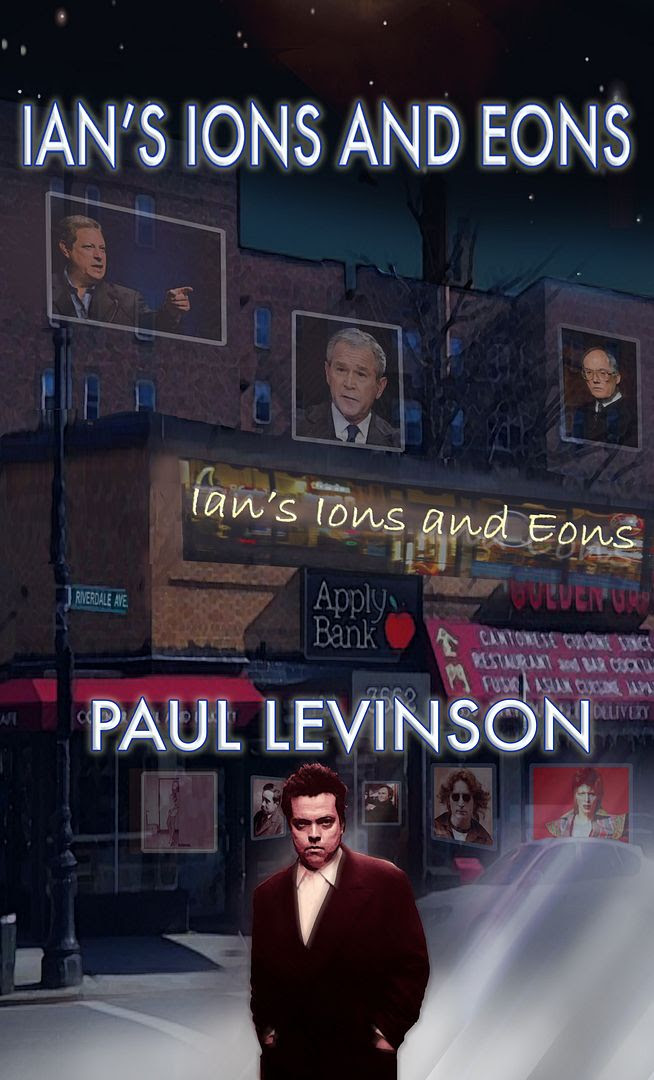time-travel stories about Orson Welles, John Lennon, David Bowie, more
Why is time travel so pleasurable? I mean to read or watch on the screen or listen to in a radio play or an audio book - and, in my case, to write - because I am sure I've never actually time traveled (living into the future a moment at a time is not actually time travel, in my book, which would entrail traveling to the future faster or slower than in normal time or traveling to the past at all). And I'm almost as sure which is to say very sure that no one else has ever time traveled, or will time travel, either.
And that's why time travel is my favorite kind of science fiction, which makes it my favorite kind of fiction, period - precisely because it’s almost certainly impossible. Not like travel to other planets, which makes great science fiction, but we're already beginning to do in reality. Or artificial intelligence and robots, which also makes for great science fiction, but we're also already beginning to do, a least little. But time travel is different because it's so likely impossible - as far we know, we're not doing any of it today, and have never done it. As far as we know, no one from the future has yet to pay us a visit. And because time travel is so likely impossible, seeing how time travel stories can work, can make sense, anyway, is a special kind of enjoyable.
Why is time travel impossible? Well, if you travel to the past to change whatever event, and you succeed, how would you have had knowledge about the event you went back to change in the first place? This is often called the grandfather paradox – if you go back in time and accidentally kill your grandfather, then you wouldn’t have been born, so how could you have gone back in time in the first place? But actually there’s no need to kill anyone in your ancestral family for this paradox to be upon you, the time traveler. Anything you do, when you travel back in time, that invalidates the reasons or necessary ingredients for the trip, would trigger the paradox.
There are lots of ways out of this, such as the multiple-worlds interpretation, which works like this: Time traveler 1 (TT1) from World 1 travels back in time, and accidentally prevents either set of grandparents (or parents) from meeting. So TT1 is never born. And in that world - call it World 2 - since TT1 doesn’t exist, there may never be any time travel. But that’s ok, because it was TT1 from W1 who went back in time, stopped the grandparents or parents from meeting, which resulted in W2 with no TT1 or TT2. So: no paradox at all with these multiple worlds.
But if our existence really consisted of an infinite number of multiple worlds or realities, with a new one triggered with every drop of the time traveler's figurative hat, that would make for an existence far more insane than just our normal world would be with time travel, right? I mean, a new world created with every drop of the time traveler's hat, or even if no hat is dropped, by the time traveler just catching someone's eye at just the right or wrong time, and distracting that person for some kind of crucial instant - well, hey, that's even crazier than time travel, right?
All right, but what about travel to the future? No grandparent paradoxes there, but we run into other serious problems. If I travel one day into the future, and I see you wearing a blue hat, what does that mean for you? That you have no choice but to wear a blue hat? Well I don’t know about you, but I think I have a choice about what color hat to wear tomorrow, or not wear any hat at all. We call that free will. Don’t you think you have that ability too, or do you think everything you do from now on is available to the scrutiny of anyone in your vicinity who travels into the future, which would result in your doing just that, and only that, whatever other ideas you might have between right now and tomorrow about what to wear on your head or otherwise do tomorrow?
Time travel is such a pleasurable exercise for the mind that I get a kick just thinking about it, making the impossible seem possible, and writing stories and novels with those paradoxes and loops. But reading a great novel like Isaac Asimov’s The End of Eternity or Robert Heinlein's The Door Into Summer, or seeing a movie like Back to the Future (any of the three) or 12 Monkeys or Primer, or a new television series like Travelers (back next week for its second season) or Dark or Erased (all on Netflix) – well, that’s always a big treat indeed. If you’ve read this far, I’d bet that at least some part of your brain agrees … at least, in this timeline.

It started in the hot summer of 1960, when Marilyn Monroe walked off the
set of The Misfits and began to hear a haunting song in her head,
"Goodbye Norma Jean" ...

watch The Chronology Protection Case FREE on Amazon Prime



No comments:
Post a Comment